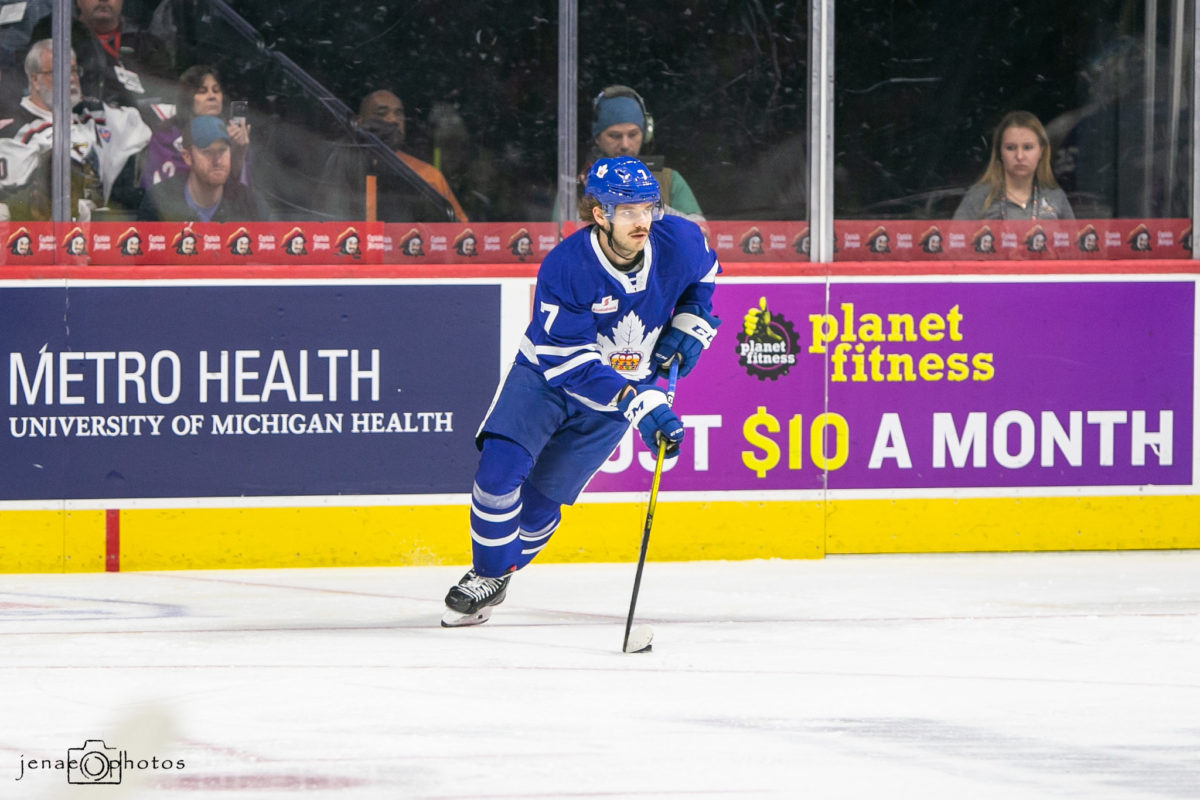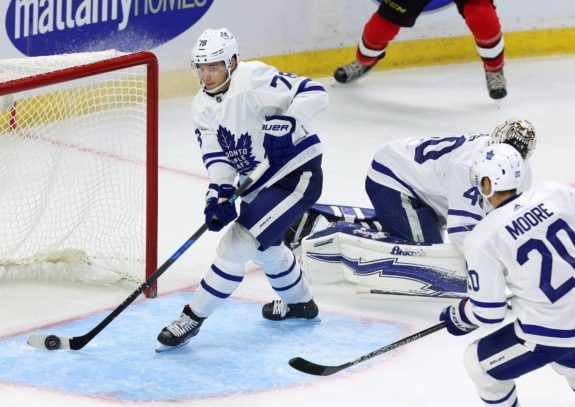This is a key season for the Toronto Maple Leafs. This is also a key season for young defenseman Timothy Liljegren. The team has a conundrum. How will it find the playing time to develop Liljegren as a prospect and further their organization’s Stanley Cup ambitions both at the same time?
Where Timothy Liljegren Stands with the Maple Leafs’ Organization
The Maple Leafs have a number of questions that need to be answered this season. Chief among them is the question of what to do with Liljegren and where he stands in the organization’s future. Liljegren’s waiver exempt status ends at the end of this coming season, so it isn’t as if the team can keep moving the issue up and down. It’s the season to figure it out.
Related: Maple Leafs’ Rasmus Sandin’s Development Derailed For Two Reasons
Liljegren’s entry-level contract also ends at the end of the 2021-22 season. He’ll become a restricted free agent without arbitration rights at the end of the upcoming season; and, as a result, his bargaining position won’t be strong. More importantly, starting next season, he’ll have to clear waivers to be sent down to the minors.
Liljegren’s Growth within the Maple Leafs’ Organization
Because Liljegren hadn’t played junior hockey in North America, he was eligible to play in the AHL as an 18 year old, instead of having to wait until he turned 20. As a result, it seems like he’s been in the Maple Leafs’ system forever. Because he’s been around so long, it’s easy to forget he’s only 22 years old.

Looking back at the 2017 NHL Entry Draft, Liljegren was selected during the first round (17th overall) by the Maple Leafs. He had been ranked as high as third in the draft the year before, but a bout of mononucleosis restricted his playing time and performance in his draft year. As a result, he fell to the 17th position.
Despite having some flaws in his game, notably his skating, as a teenager Liljegren still held his own in the AHL. He scored four goals and 28 assists (for 32 points) in 87 games during his first two Toronto Marlies’ seasons. He added nine assists for nine points in 33 games during the playoffs and was part of the 2018 Calder Cup Championship team.
Related: Maple Leafs’ Prospect Liljegren Deserves Promotion with Call-Up
The next season as a 20-year-old, his development took another step forward when he scored five goals and added 25 assists (for 30 points) in 40 games. However, his status as a prospect was overshadowed by the rapid development of teammate Rasmus Sandin. Liljegren did play an 11-game stint during the 2019-2020 season with the Maple Leafs, to mixed reviews.
This past season, like a lot of players, Liljegren’s playing time was limited by Covid-19. Because the organization was trying to solve a problem with its defense by signing Zach Bogosian, Liljegren was pushed down the depth chart and only saw two games with the Maple Leafs.
Because the Marlies did play a limited season, Liljegren played only 21 games with them. In those games, he posted two goals and nine assists (for 11 points). Obviously, the organization was watching because he was heavily praised by Maple Leafs’ general manager Kyle Dubas for the improvements he make to his defensive game.
What Happens Now with Liljegren?
So what happens with Liljegren this season? As the team heads into the 2021-22 regular season, barring deals or injuries, the Maple Leafs top six defensemen appear to be Jake Muzzin, Morgan Rielly, T.J. Brodie, Justin Holl, Travis Dermott, and Rasmus Sandin.
Liljegren needs to play – somewhere. If the top six defensemen remain healthy, when will he get into games? Who sits out?
Related: Ovechkin, His Milestone Goals & the Goalies He Beat
With Rasmus Sandin only having a total of 42 games of NHL experience and Liljegren having only played 13 NHL games to date, it’s hard to believe that head coach Sheldon Keefe sees the efficacy in playing both of them together. That is, unless he’s forced to due to injury.
The Maple Leafs have the luxury of being able to play Dermott on both the left and the right side. As a result, they could rotate Sandin and Liljegren in and out of the lineup. Still, Sandin also needs to get ice time if he’s to develop.

One benefit the Maple Leafs can leverage is that both Liljegren and Sandin are waiver exempt. They could move up and down freely between the NHL and AHL. Perhaps in a perfect world, each of them getting lots of playing time with both teams could be an option.
It Used to Be Easier for the Maple Leafs to Develop Players
Prior to the 2016-17 season, when the Maple Leafs were a poor NHL team, it was far easier to get prospects ice time. The team was so bad that there was little downside inserting young players into the lineup.
Things changed as the Maple Leafs improved; and, there’s even more pressure over the past few seasons because the team is in a full-out “win now” mode. There’s simply not as much leeway to insert untested prospects into the roster. Instead, the team needs to walk a tightrope between developing their young players and going all out to win the Stanley Cup. That’s why Liljegren’s development is of utmost importance to the future of the team.
Related: Maple Leafs News & Rumors: Liljegren, Galchenyuk & Campbell
So here we are bumping into the start of the 2021-22 NHL regular season. One issue the Maple Leafs have is how to find youngster Timothy Liljegren playing time in ways that will both further his development and help the team move towards an extended run towards the Stanley Cup.
Both are important.
[Note: I want to thank long-time Maple Leafs’ fan Stan Smith for collaborating with me on this post. Stan’s Facebook profile can be found here.]